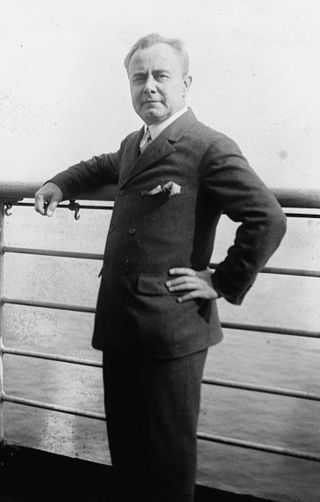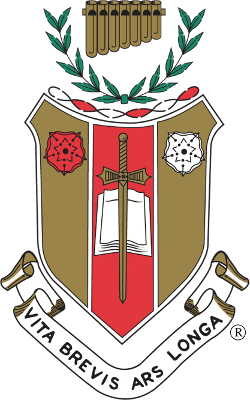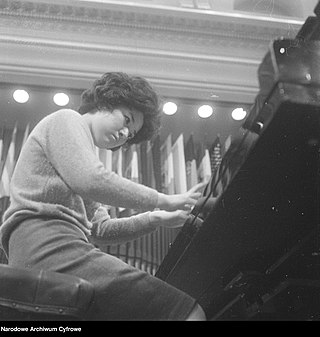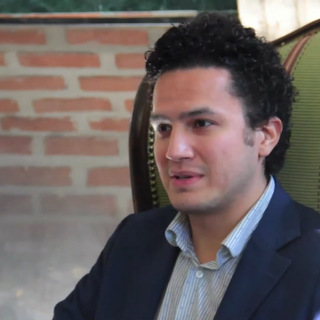Related Research Articles

Josef Casimir Hofmann was a Polish-American pianist, composer, music teacher, and inventor.

Ignaz Friedman was a Polish pianist and composer. Critics and colleagues alike placed him among the supreme piano virtuosi of his day, alongside Leopold Godowsky, Moriz Rosenthal, Ferruccio Busoni, Josef Hofmann and Josef Lhévinne.

Rosina Lhévinne was a Russian and American pianist and famed pedagogue.

Emil Georg Conrad von Sauer was a German composer, pianist, score editor, and music (piano) teacher. He was a pupil of Franz Liszt and one of the most distinguished pianists of his generation. Josef Hofmann called von Sauer "a truly great virtuoso." Martin Krause, another Liszt pupil, called von Sauer "the legitimate heir of Liszt; he has more of his charm and geniality than any other Liszt pupil."
Ursula Oppens is an American classical concert pianist and educator. She has received five Grammy Award nominations.

Sigma Alpha Iota (ΣΑΙ) is a national music fraternity. Formed to "uphold the highest standards of music" and "to further the development of music in America and throughout the world", it continues to provide musical and educational resources to its members and the general public. Sigma Alpha Iota operates its own national philanthropy, Sigma Alpha Iota Philanthropies, Inc. Sigma Alpha Iota is a member of the National Interfraternity Music Council and the Professional Fraternity Association.

Ruth Slenczynska is an American pianist with Polish roots.
Adele Marcus was an American pianist and instructor whose career was based at the Juilliard School in New York City.

Hiroko Nakamura was a Japanese pianist.
Elza Kolodin is a pianist from Poland. She studied in Kraków, Warsaw and Paris.

The Conservatorio Nacional de Música is a music conservatory located in the Polanco neighborhood of Mexico City, Federal District, Mexico.
Yolanda Moreno Rivas was a Mexican pianist, teacher and musicologist.

Alberto Jonás was a Spanish pianist, composer, and piano pedagogue. Although not much is known about his life, as a pianist he was regarded as a virtuoso on the level of Ignacy Jan Paderewski, Moriz Rosenthal, Leopold Godowsky, Josef Hofmann, and Josef Lhévinne. He also ranked, during the 1920s and '30s, among the greatest and most sought-after keyboard pedagogues of the time.
Rebecca Penneys is an American-born pianist of Russian-Ukrainian-Jewish descent. She is a recitalist, chamber musician, orchestral soloist, educator, and adjudicator. In 1965, she was the youngest contestant to have ever entered the International Chopin Competition in Warsaw, Poland:

Zdenka Ticharich was a Hungarian pianist, music educator and composer.

Abdiel Vazquez is a Mexican pianist who has won major awards for his playing both in Mexico City and in New York. Vazquez grew up just outside the city of Monterrey to a doctor and an engineer. He began studying the piano at age six, but his parents did not realize the extent of his talent until he won his first competition at the age of twelve. Vazquez did his professional studies at the Escuela Superior de Música y Dance de Monterrey, and after receiving a scholarship, went on to the Manhattan School of Music, then studied privately in Madrid. He currently lives in New York, working as a vocal coach with Metropolitan Opera House and Juilliard School. In 2006, he won the Angelica Morales-Yamaha National Piano Competition, his debut at the Palacio de Bellas Artes, and in 2013 he won Shining Stars Debut Series, his debut at Carnegie Hall.

Minuetta Shumiatcher Borek Kessler was a Russian-born Canadian and later American concert pianist, classical music composer, and educator. A child prodigy, she performed her first composition at a recital at the age of 5 in Calgary, Alberta, Canada, and went on to study at the Juilliard School in New York City. She composed hundreds of pieces, including music for piano, violin, voice, flute, clarinet and cello, as well as for chamber ensembles. She performed all over Canada and in Boston and New York, including performances at Carnegie Hall and The Town Hall, and with the Boston Civic Symphony and the Boston Pops. The New York Times called her "a rare phenomenon among the younger pianists of today – more musician than pianist". She also taught musical composition to young children, creating and patenting a game called "Staftonia" for this purpose.

Madeleine (Hsu) Forte is a Franco-American pianist, recording artist, and Professor Emerita of Piano at the Morrison Center for the Performing Arts at Boise State University.
Lila-Gene George was an American composer and pianist. Her work included chamber music, piano and vocal music. She graduated from the University of Oklahoma and studied under several prominent composers, later performing in the United States and abroad.
Nadia Stankovich also known as Nadia Stankovitch was a Yugoslav-born Mexican pianist, concert player and teacher, highlighted by the interpretation of the works of Mexican composers as Juventino Rosas and Ricardo Castro.
References
- 1 2 "Obituary for Angelica von Sauer". St. Joseph News-Press. 1996-04-24. p. 12. Retrieved 2022-10-16.
- ↑ Pareyon, Gabriel (2001). Encyclopedic Dictionary of Music iVol. 1n Mexico. Jalisco: Panamarican University. ISBN 968-5557-82-9.
- 1 2 3 4 5 6 7 Tapia, Maria Eugenia (May–June 1999). "Mexican marvel". Piano & Keyboard; San Anselmo (198): 35–38.
- ↑ Garda, Juan Carlos (24 November 1995). "Llega la mejor pianista mexicana del siglo". Reforma; Mexico City [Mexico City] (in Spanish). p. 1 – via ProQuest.
- ↑ Clark, J. Bunker (1986). Music at KU: A History of the University of Kansas Music Department. University of Kansas, Department of Music and Dance.
- ↑ Castrillon, Maria Teresa (2007). Angelica Morales: Story of a Mexican Pianist. Mexico. ISBN 978-970-35-1248-5.
{{cite book}}: CS1 maint: location missing publisher (link) - 1 2 Bucio, Erika P. (15 June 2016). "Una pianista "infalible"". Reforma; Mexico City [Mexico City] (in Spanish). p. 20 – via ProQuest.
- ↑ "Concert by von Sauer played in grand style". Evening Star. 1956-01-11. p. 52. Retrieved 2022-10-16.
- ↑ Esperanza, Pulido (1983). "The Mexican Woman in Music". Latin American Music Review: 120-131.
- ↑ "Pianist in reunion with orchestra from Mexico". The Kansas City Star. 1958-11-07. p. 17. Retrieved 2022-10-16.
- ↑ Morales von Sauer, Angelica. "J.S. Bach, Well-Tempered Clavier". YouTube.
- ↑ Morales von Sauer, Angelica. "Chopin Sonata No. 3". YouTube.
- ↑ Hendrix, Michael (8 December 2017). "Honorary Member - Sigma Alpha Iota International Music Fraternity". www.sai-national.org. Retrieved 2022-10-16.
- ↑ Pan Pipes of Sigma Alpha Iota. George Banta Company. 1978. p. 23.
- ↑ Bertran, Antonio (31 October 1995). "Realizan Primer Concurso de Piano Angelica Morales". Reforma; Mexico City [Mexico City] (in Spanish). p. 1 – via ProQuest.
- ↑ Cultura, Secretaría de. "Recuerdan vida y obra de la pianista Angélica Morales con exposición en el Cenart". gob.mx (in Spanish). Retrieved 2022-10-16.